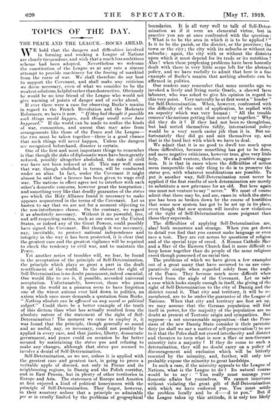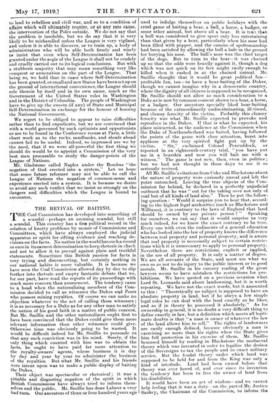TOPICS OF THE DAY.
THE PEACE AND THE LEAGUE.—ROCKS AHEAD.
WE hold that the dangers and difficulties involved in forming and working a League of Nations are clearly tremendous, and wish that a much less ambitious scheme had been adopted. Nevertheless we welcome the constitution of the League as at any rate a sincere attempt to provide machinery for the freeing of mankind from the curse of war. We shall therefore do our best to support the Covenant, and shall make any criticism we deem necessary, even of what we consider to be the weakest solutions, helpful rather than destructive. Obviously he would be no true friend of the League who would not give warning of points of danger and of rocks ahead.
If ever there were a case for observing Burke's maxim in regard to the French Revolution and the Moderate
Reformers, we have it now. If they had thought it possible such things mould happen, such things would never have happened.' If the world can be made to realize the kinds of war, commotion, and unrest that may arise from arrangements like those of the Peace and the League— the two must be taken together—there is a good chance that such things will never happen. Unless the dangers are recognized beforehand, disaster is certain. One of the first and most important things to remember is that though the risks of diplomatic wars have beengreatly reduced, possibly altogether abolished, the risks of civil war have not been reduced at all. This may well mean that war, though abolished in terms, will be conducted under an alias. In fact, under the Covenant it might almost be said that a licence has been given to wage civil war. The nations in effect agree not to interfere with each other's domestic concerns, however great the temptation ; and something very like that deadly guarantee of the status quo which the Holy Alliance found it necessary to make appears sequestered in the terms of the Covenant. Let us hasten to say that we are not for a moment objecting to the non-interference clause. On the contrary, we regard it as absolutely necessary. Without it no powerful, free, and self-respecting nation, such as our own or the United States, or indeed any of the Great Powers, could possibly have signed the Covenant. But though it was necessary, nay, inevitable, to protect national independence and integrity in the way it has been protected, it is clear that the greatest care and the greatest vigilance will be required to check the tendency to civil war, and to maintain the Peace.
Yet another series of troubles will, we fear, be found in the acceptation of the principle of Self-Determination, the principle which plays so great a part in the draft resettlement of the world. In the abstract the right of Self-Determination is no doubt paramount, indeed essential. One would like to see it, if possible, accorded universal acceptation. Unfortunately, however, those who press it upon the world as a panacea seem to have forgotten one of the wisest axioms over laid down in politics, an axiom which once more demands a quotation from Burke. "Nothing absolute can be affirmed on any moral or political subject.' Could there be a better example of the truth of this dictum than what has actually resulted from the absolute nature of the statement of the right of Self- Determination ? The moment we came to employ it, it was found that the principle, though generally so sound and so useful, nay, so necessary, could not possibly be applied in every case, and that justice, liberty, democratic government, and peace could on occasion be far better secured by maintaining the status quo and refusing to make any changes, although that status quo seemed to involve a denial of Self-Determination.
Self-Determination, as we see, unless it is applied with the greatest care and greatest tact, is going to prove a veritable apple of discord, not only in Fiume and its neighbouring regions, in Danzig and the Polish corridor, and in East Prussia, but in plenty of other territories in Europe and Asia. The statesmen of Europe and America at first enjoyed a kind of political honeymoon with the principle of Self-Determination. They forgot, however, in their amatory ardour that a principle so admirable per se is cruelly limited by the problems of geographical
boundaries. It is all Very well to talk of Self-Deter- mination as if it were an elemental virtue, but in practice you are at once confronted with the question : What is to be the area in which it is to be applied! " Is it to be the parish, or the district, or the province; the town or the city; the city with its suburbs or without its suburbs ; again, the city with or without the districts upon which it must depend for its trade or its nutrition! Alas ! when these perplexing problems have been honestly dealt with there is very little scope left for the abstract policy, and we have ruefully to admit that here is a fine example of Burke's. maxim that nothing absolute can be affirmed in politics.
Our readers may remember that some months ago we invoked a lively and living rustic Oracle, a shrewd farm labourer, who was asked to give his opinion in regard to this very point. Very naturally he at first went a" header" for Self-Determination. When, however, confronted with the difficulty of the unit of application, he replied with an asperity which was very human "All the trouble comeso' the nations getting that mixed up together." Why did they do it ? If they had not been so thoughtless, but had sorted themselves tidily, international policy would be a very much easier job than it is. But un- fortunately they did go and mix themselves up, and that is the hard fact with which we have to deal.
We admit that it is no good to dwell too much upon these difficulties, because something has got to be done, and mere negative criticisms, however true, give very little help. We shall venture, therefore, upon a positive sugges- tion. It is that in cases where the difficulties of action seem insuperable the only thing to do is to preserve the status quo, with whatever modifications are possible. To put it another way, Self-Determination must never be applied if the first results of such determination are merely to substitute a new grievance for an old. But here again one must not venture to say" never." We must of course admit that there may be, and are, cases in which the status quo has been so broken down by the course of hostilities that some new system has got to be set up in its place, even though that new system will involve new violations of the right of Self-Determination snore poignant than those they supersede.
The difficulties of applying Sell-Determination are, alas! both numerous and strange. When you get down to detail you find that you cannot make language or even race a test. They are cut across by questions of religion and of the special type of creed. A Roman Catholic Slav and a Slav of the Eastern Church find it more difficult to keep house together than do people of the same religious creed though possessed of no racial ties. The problems of which we have given a few examples out of a great many that have occurred to us are com- paratively simple when regarded solely from the angle of the Peace. They become much more difficult when viewed from the angle of the Covenant. Let us take a case which looks simple enough in itself, the giving of the right of Self-Determination to the city of Danzig and the district round it. That city and territory, it will be re- membered, are to be under the guarantee of the League of Nations. When that city and territory are first set up, we may assume that the German population will find itself in power, for the majority of the population are no doubt at present of Teutonic origin and sympathies. But suppose—a not unreasonable supposition—that the Prus- sians of the new Danzig State consider it their patriotic duty (or shall we say a matter of self-preservation?) tO see• to it that the Poles shall not crowd into the city and dietrict and threaten to turn what is now a Slav or non-German minority into a majority! If they do come to such a determination, they will no doubt carry on a policy of discouragement and exclusion which will be bitterly resented by the minority, and, further, will only too probably expose the minority to great hardships. In such a case, if the minority appeals to the League of Nations; what is the League to do ? Its natural course would be to say : "Ion really must manage your domestic affairs for yourselves. We cannot intervene without violating the great gift of Self-Determination with which we have endowed you. You must settle the problem locally and be d—d to you." But if the League takes up this 'attitude, it is only too likely to lead to rebellion and civil war, and so to a condition of affairs which Will Ultimately require, or at any rate cause, the intervention of the Poles outside. We do not say that the problem is insoluble, but we do say that it is very likely to be mishandled unless the League is very vigilant, and unless it is able to discover, or to train up, a body of administrators who will be able both firmly and wisely ter insist that even when Self-Determination has been grantedunder the aegis of the League it shall not be crudely and cruelly carried out to its logical conclusions. But with a stubborn majority that may mean something very like conquest or annexation on the part of the League. That being so, we hold that in cases where Self-Determination has been granted, or small and new States have been setup on the ground of international convenience, the League should rule therein by itself and in its own name, much as the Government of the United States rules in Washington and in the District of Columbia. The people of Washington have to.give up the sweets (if any) of State and Municipal Self-Determination in exchange for the honour of housing the National Government.
We regret to be obliged to appear to raise difficulties rather than to find expedients, but we are convinced that with a world governed by such optimists and opportunists as are to be found in the Conference rooms at Paris, a little chart work as to the rocks, sandbanks, and shoals ahead cannot fail to be useful. Indeed, so impressed are we by the need, that if we were all-powerful the first thing we should do would be to appoint a Commission of the very best men procurable to study the danger-points of the League of Nations.
Mr. Gladstone called Naples under the Bombes "the negation of God erected into a system." Let us hope that some future reformer may not be able to call the League of Nations the negation of common-sense and experience erected into a system. It is because we desire to avoid any such verdict that we insist so strongly on the dangers and difficulties which the League is bound to encounter.



































 Previous page
Previous page